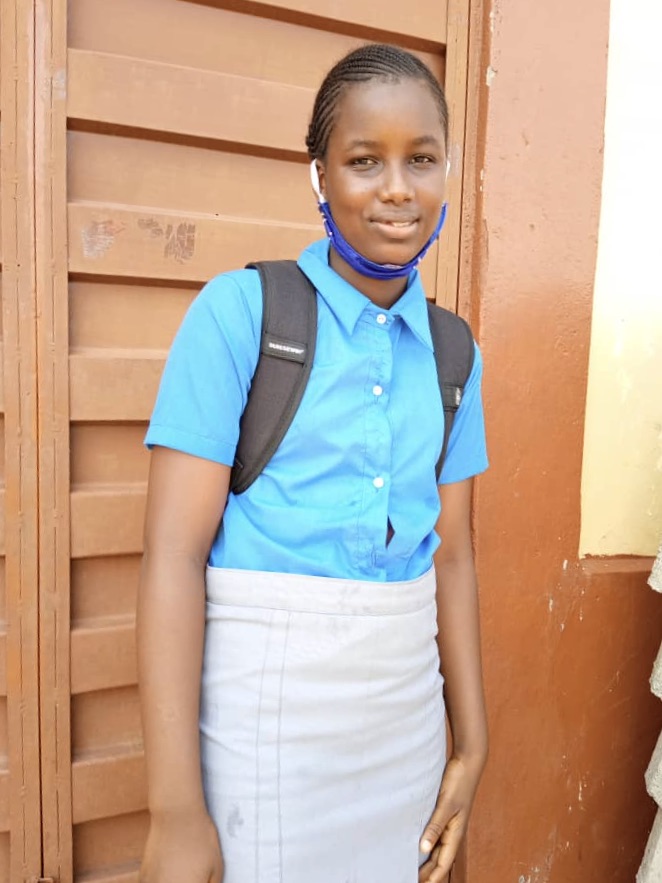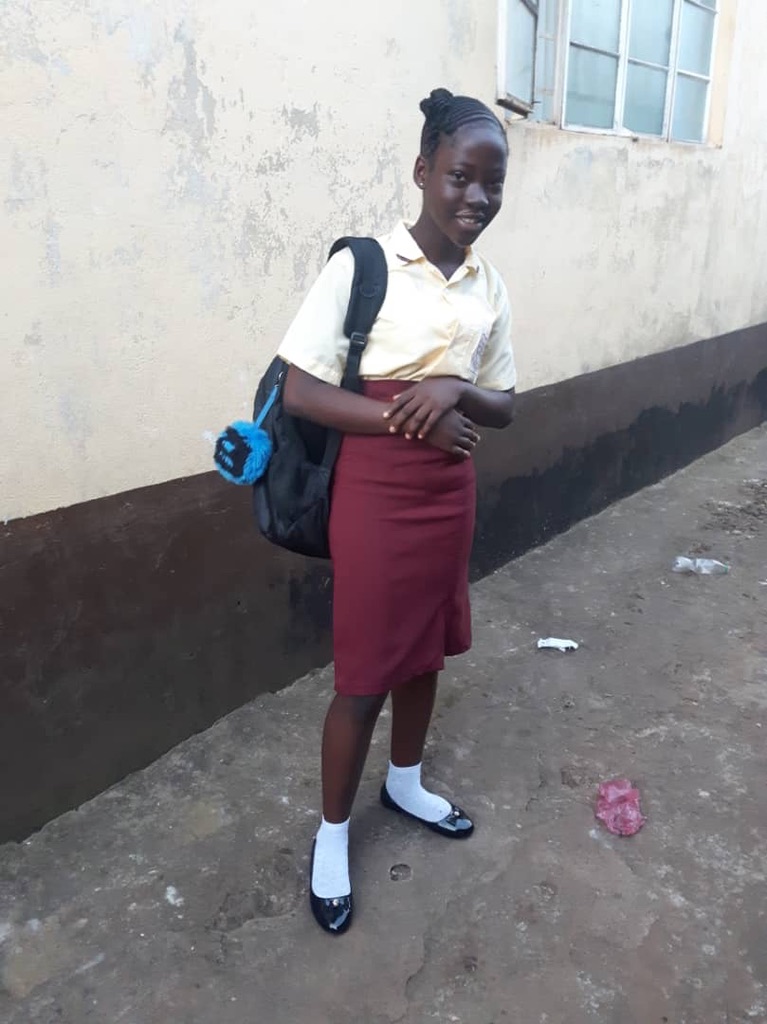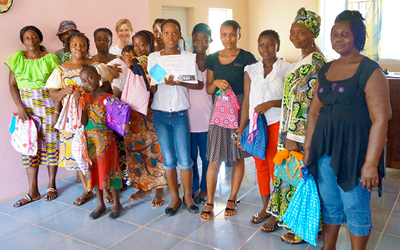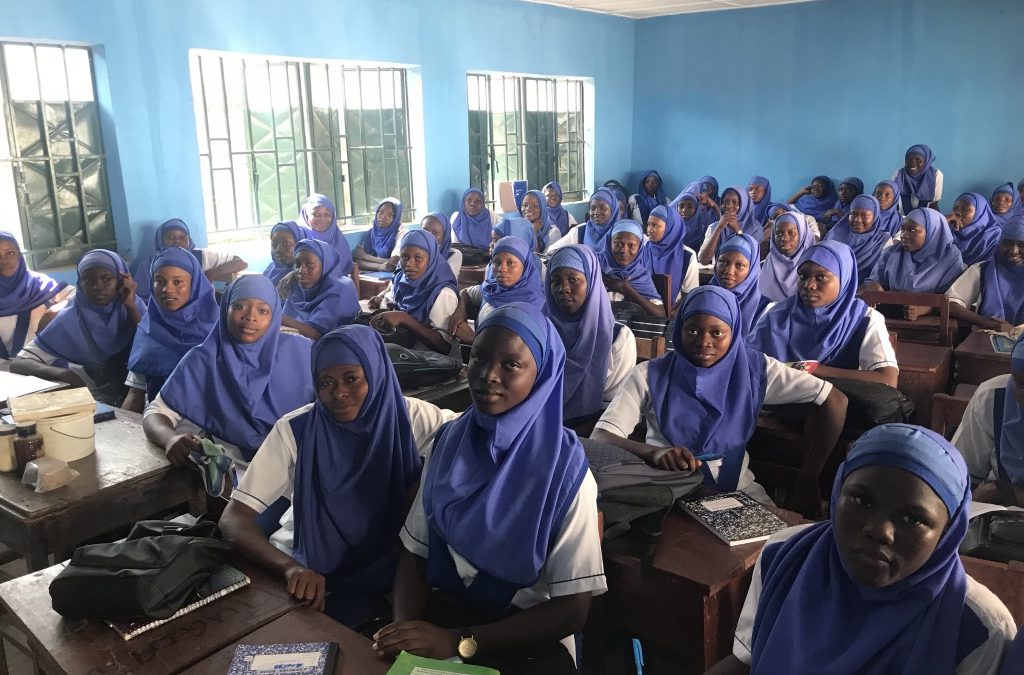Sunday 11 October 2020, across the globe the spotlight is on the rights of women and girls, everywhere.
The 2020 theme, “My voice, our equal future”, rallies to protect young girls and their healthy and safe progression into the future by bringing attention to the unjust realities these young women face on a daily basis.
For girls in Sierra Leone (like Safiatu* right, sponsored by Kylie Deeth), like many others in developing countries, gender inequality is rampant and has devastating impacts on all realms of life. Ranking number 153 of 162 countries on the Gender Inequality Index, female Sierra Leonians have a lower chance of attending secondary school or gaining a seat in parliament [1]. In combination with gendered-violence, early marriage, denied access to birth control, poor health infrastructure, in addition to drastically basic education, women’s health is severely impacted. As seen in their higher rates of maternal mortality, and health consequences including medical complications including death and psychological impacts of female genital mutilation (FGM) [2].
Education is one of the most crucial factors of a young woman’s life, however, due to marginalisation and discrimination overwhelming this group, it is one of the worst impacted.

Safiatu* sponsored by The Deeths

Hawa* sponsored by Alison and Emily Shakespeare-Jones
Earlier this year in March 2020, we saw positive steps occurring for girls and their rights to an education, with the lifting of a ban preventing pregnant girls attending school. The ban which was implemented in 2015 after the Ebola crisis was in direct breach of human rights listed in United Nations (UN) Convention on the Rights of the Child, that Sierra Leone is a signatory to [3]. While this is a success story for Sierra Leone, sexual violence, child marriage, teenage pregnancies, in addition to FGM are all still keeping girls going to school altogether – reinforcing the gender gap.
To change the narrative, we MUST:
- Stand together to call out and challenge bias and discrimination.
- Disrupt the normalisation of violence against women.
- Nurture, support and empower all women.
How YOU can help?
Far from Sierra Leone, you might feel stuck on what exactly you can do to advocate for these young girls and women who are facing these life-threatening breaches of human rights. However, there is plenty that can be done from the other side of the world.
1. Sponsor a Fig Tree Girl
With your support, a young girl will receive what she needs to be able to participate in education and learn the important skills that can ignite change, fight poverty and protect social justice. Christiana who is facing personal and family challenges needs sponsorship to provide her with bare essentials such as school fees and equipment, as well as a small allowance to pay for shelter and food. Please consider your invaluable assistance, and sponsor Christiana today.
2. Provide a girl one year’s supply of sanitary pads.
Menstruation is yet another barrier to a girl’s education keeping them at home for the duration, due to not having reasonable sanitary products, safe or adequate toilet facilities among other reasons. Read more about this extremely important topic here. Help end period poverty and empower a young Sierra Leonean woman this Day of the Girl Child.
Help provide a girl in Sierra Leone with a year’s supply of sanitary pads (reusable or disposable depending on the girl’s preference and circumstances). $5 AUD of each donation will go to The Fig Tree Children Emergency Health Fund.

References:
[1] United Nations Development Programme. (2019). Inequalities in Human Development in the 21st Century. http://hdr.undp.org/sites/all/themes/hdr_theme/country-notes/SLE.pdf
[2] Bjälkander, O., Bangura, L., Leigh, B., Berggren, V., Bergström, S., & Almroth, L. (2012). Health Complications of Female Genital Mutilation in Sierra Leone. International Journal of Women’s Health, 4, 321–331. https://doi.org/10.2147/IJWH.S32670
[3] Amnesty International. (2016). Sierra Leone: Amnesty International Submission to the Committee on the Rights of the Child. https://www.amnesty.org/en/documents/afr51/4583/2016/en/



By liberating , educating and empowering the women of this world we might just stand a better chance of making this world a better place.
Sarah & Karl.